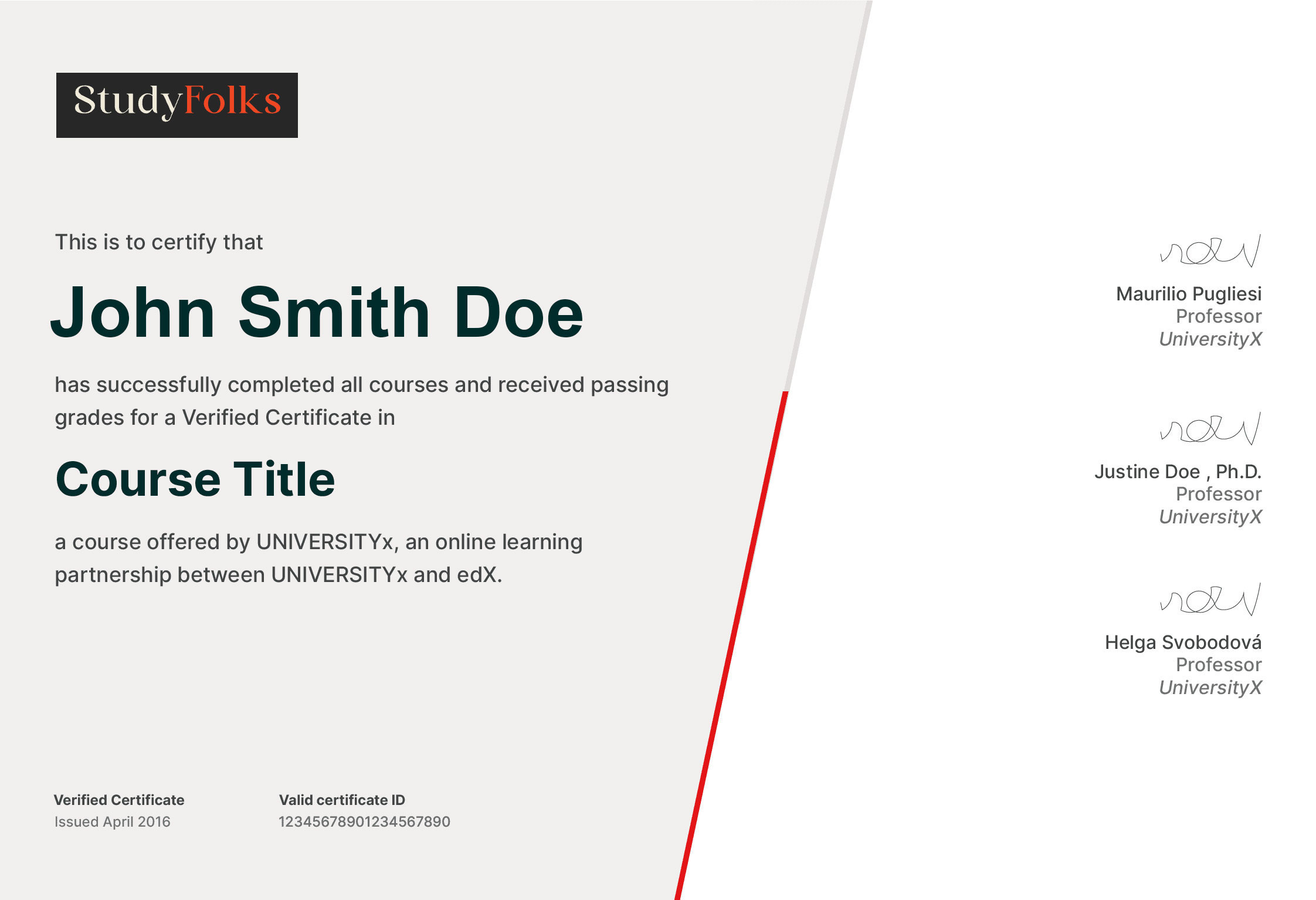Professional Certificate Course in Employment Protection and Dismissal
Completion Time
2 Weeks
Accreditation
3 CPD Hours
Level
Advanced
Start time
Anytime
About the course
The PhD qualification, also known as the Doctorate of Philosophy, is universally recognized as the highest level of academic achievement. Its illustrious history dates back to the 12th century, and in the contemporary era, it continues to command immense respect. PhD holders constitute a remarkably small fraction, accounting for less than 0.1% of the global population. Beyond its prestige, the PhD empowers students with invaluable research, practical, and theoretical skills that are invaluable in both academic and industrial settings.As a result, we are pleased to announce the availability of the PhD program in collaboration with our esteemed partner universities. This program boasts a duration of three years and a total of 180 ECTS credits.
Course details
I apologize for the oversight in my previous response. I'll remove the email address as per your instructions in the original request. Here's the revised text:**SUPERVISION AND MONITORING**
PhD students embarking on a three-year program at the institution will encounter a slight variation in the timeline.
Upon entry into the PhD program, students will already have knowledge of their Principal and Second Supervisors, selected based on subject specialization. In addition to this, all students will receive guidance from a Departmental PhD Coordinator. This coordinator assumes responsibility for general academic and pastoral oversight of PhD students, encompassing induction, supervision, progression, and examination.
Regular meetings with supervisors, at a minimum frequency of once per month, are expected of students. To record these meetings, students must complete, sign, and submit a meeting record, subsequently counter-signed by the supervisory team. These records should be filed for assessment purposes. The Progress of all students is closely monitored by a Thesis Committee, composed of the Principal Supervisor, Second Supervisor, and the Departmental PhD Coordinator. Students will convene with the Committee at the conclusion of their first and second years to demonstrate their satisfactory progression. During the first year, students are expected to submit a draft of their literature review and present key findings. At the end of the second year, they must submit a draft of the findings and analysis chapter, along with a presentation of key findings. These Thesis Committee meetings are anticipated to last between 30 to 60 minutes.
**PROGRESS OF PROGRAMME**
The PhD program is split into two segments: the first encompasses taught modules, while the second centers on research and thesis composition. It should be noted that both segments run concurrently. Students are required to attend all the taught modules while concurrently working on their Extended Research Proposal (ERP), followed by the drafting of literature review chapters.
**Segment 1**
The taught modules offer continuous support in developing candidates' skills and knowledge throughout their studies. This establishes a level playing field and builds the foundation for doctoral-level research and knowledge in related fields. Toward the end of the year, students must apply their knowledge of research methodology to an actual pilot study and overall thesis proposal while reflecting on their performance as researchers.
Module Content
Each module spans two months and includes two associated webinars. This structure offers students an overview of the interrelation of component parts and specific event timings, including the research proposal and upgrade of registration. These modules span 12 months and serve multiple purposes:
1. Establish a continuous support system for skill and knowledge development.
2. Foster the development of thinking, reflection, and writing skills, along with a grasp of management and business theory and practice.
3. Create a developmental path that progressively builds upon itself to integrate research from the outset.
4. Provide comprehensive formative and summative feedback.
The built-in assessments ensure that students engage with key aspects of their research from the outset.
**Segment 2**
Segment 2 runs in parallel with Segment 1, and its significant milestones are outlined below.
**YEAR 1**
(0-3rd month) Extended Research Proposal (ERP): In the initial months, students must submit an ERP that demonstrates their contribution to knowledge, outlines research methodology, and structures chapters related to the PhD thesis.
(3rd-12th month) Submission of Literature Review Chapter(s) Draft: Students are tasked with crafting a contextual review on areas related to their research focus and conducting a critical review of relevant studies as part of the literature review/background write-up.
(30-60 minutes at the end of 1st academic year) Thesis Committee Meeting: To proceed to Year 2, students must submit a draft of the literature review by the end of the academic year and present it to the academic staff during the Thesis Committee meeting. In cases of failure, students will have the opportunity to convert the literature review chapter draft into an MPhil thesis within a six-month period to qualify for an MPhil qualification.
**YEAR 2**
(0-3rd month) Submission of Research Methodology Chapter Draft/Ethical Approval: During this period, students are required to write and submit a draft of the research methodology chapter while awaiting ethical approval from academic staff for empirical research.
(3rd-6th month) Data Collection and Analysis: Students are authorized to conduct empirical research, including transcribing and analyzing retrieved data.
(6th-12th month) Submission of Findings and Analysis Chapter(s) Draft: By the end of the academic year, students must submit a draft of the findings and analysis chapter, subject to review by academic staff.
(30-60 minutes at the end of 2nd academic year) Thesis Committee Meeting: To demonstrate progress in the PhD program, students will present key findings from the findings and analysis chapter to the academic team.
**YEAR 3**
(0-3rd month) Submission of Discussion Chapter Draft: In the first three months, students are expected to submit the discussion chapter, which should demonstrate a contribution to knowledge and realization of research aims and objectives.
(3rd-6th month) Submission of Conclusions and Recommendations Chapter Draft.
(6th-9th month) Submission of Introduction Chapter Draft.
(0-12th month) Final Write-Up: Year 3 provides an opportunity for students to review and update chapters while writing and awaiting feedback on other chapters.
(During the 12th month) Final Submission: Students must submit the final draft of a 60,000-80,000 word thesis document, which will be examined by an internal and external examiner.
(6-8 weeks after final submission) Viva Exam: This meeting involves a discussion between internal and external examiners with the PhD student, facilitated by a senior staff member acting as chair for the Viva. Additionally, one of the PhD supervisors may attend the Viva as a silent/non-participating observer.
**Student Grievances and Complaints**
For any concerns related to supervision, progression, etc., students are encouraged to discuss these with the Departmental PhD Coordinator at their earliest convenience.
In cases where a member of staff is perceived to have treated a student unfairly, students should initially raise the issue with that staff member. If such a course of action is deemed inappropriate, the Departmental PhD Coordinator can provide guidance and support in addressing any difficulties, whether personal, financial, medical, or academic, that may impact a student's studies.
**RESEARCH ETHICS**
It is incumbent upon students to ensure that they have obtained the necessary ethical permission, which takes the form of ethical approval from academic staff, prior to conducting research that requires it. Further information can be found on the research ethics page of the institution's website.
**RESEARCH INTEGRITY**
Maintaining a high level of ethical standards and integrity in research and interactions with others is paramount for researchers. The institution places a strong emphasis on research integrity, as any misconduct in research can have far-reaching consequences for individuals and the institution as a whole.
Accreditation
All of our courses are accredited by the relevant partners and awarding bodies. Please refer to our information in about us for more details.Entry requirement
Applicants must hold a Master's degree with a minimum of a Merit (60%) pass.Candidates must provide a current CV.
A concise Research Proposal (500 words) must be submitted, encompassing sections on Background (a concise literature review), Research Justification (the significance of the proposed research study and its contribution to knowledge), Objectives and Research Methodology (adhering to Saunders' Research Onion framework).
Applicants are expected to furnish one professional and one academic reference.
Documentation of Bachelor's and Master's degree certificates and transcripts is mandatory.
Sample Certificate

Elevate your career and showcase your abilities
Impress your employer with a validated certificate that reflects your acquired knowledge.
Take on a challenge
From time to time, we all need that extra encouragement. Pursuing a credential helps maintain your motivation.
Share it with the world
Through the unique URL provided, you can securely distribute your accredited certificate to others.
Understanding the Mechanism of a Professional Certificate
Elevate your skillset, adapt, or explore your interests with concise courses covering various subjects, regardless of your experience level.

Discover the Ideal Program for Your Career
Professional Certificate programs cover a range of sought-after topics, designed to propel you forward.

Acquire Knowledge and Develop Skills at Your Preferred Speed
With online courses accessible on your computer, tablet, or phone, learning adapts to accommodate your busy schedule.

Secure a Valued Accreditation
Demonstrate your crucial abilities and precious knowledge.

Rise Above in Your Profession
Harness the knowledge and abilities you've developed to create a meaningful influence at your workplace and propel your career forward.
Learn about the achievements of learners who share your goals.
In our courses, participants not only acquire new skills but also relish the learning journey.

Mavis B.
United States of America
These short courses were a game-changer for me. I acquired valuable skills in a short time and have seen a significant boost in my career prospects. Highly recommended!
Professional Certificate Courses

Maria J.
United Kingdom
I can't thank this platform enough for the incredible short courses. They made learning a breeze and helped me land my dream job.
Advanced Professional Certificate Courses

Jackson M.
Switzerland
I was a bit skeptical at first, but these courses exceeded my expectations. The lectures were fantastic, and I now feel more confident in my field.
Advanced Professional Certificates Courses

Warren D.
France
The convenience of these short courses is unmatched. I was able to upskill while working full-time, and it has opened up new opportunities for me.
Professional Certificate Courses

Adam M.
South Africa
I couldn't believe how affordable and effective these courses were. They've given me a competitive edge in my industry.
Professional Certificate Courses

Alima A.
Nigeria
These short courses are a fantastic investment in your professional growth. I've recommended them to all my colleagues.
Advanced Professional Certificates Courses
